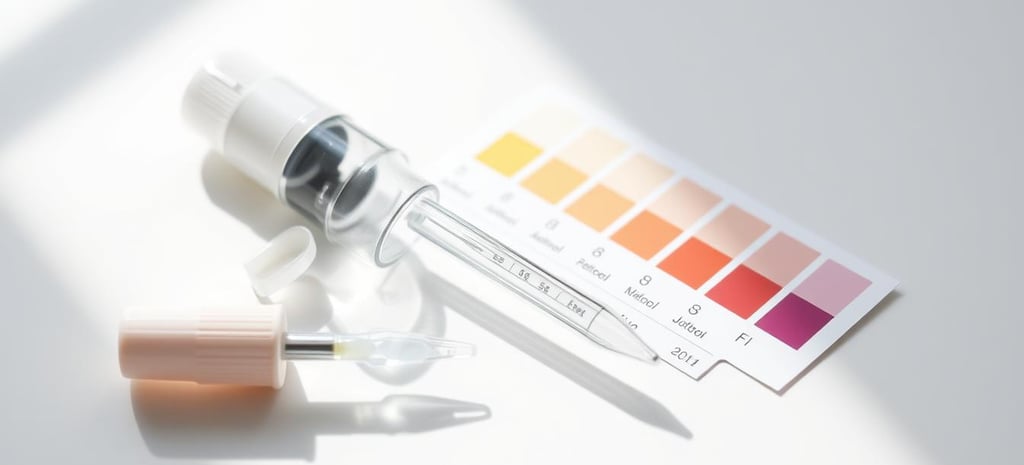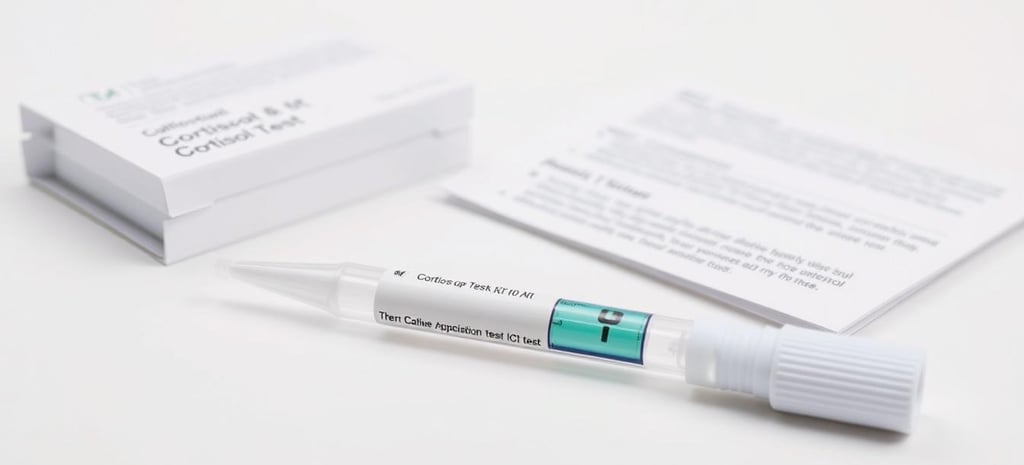Cortisol Test: What You Need to Know
Understand your cortisol levels with our reliable cortisol test. Get accurate results and expert insights to manage stress and improve your health.
STRESS MANAGEMENT
ActiveVitaLife
2/23/20258 min read
Ever wondered about cortisol tests and their importance for your health? A cortisol test, or cortisol level test, measures cortisol in your body. Cortisol is a hormone from the adrenal gland that helps with stress, metabolism, and immune function. Knowing your cortisol levels is key to staying healthy.
Introduction to Cortisol Tests
A cortisol test can spot and track issues like Cushing's syndrome and adrenal insufficiency. It lets you see your hormonal balance and take steps to improve your health. Let's explore cortisol tests, their significance, and what to expect during the process.
Key Takeaways
A cortisol test measures the levels of cortisol in your body.
Cortisol plays a vital role in stress response, metabolism, and immune function.
A cortisol level test can help diagnose and monitor conditions related to cortisol imbalances.
Understanding cortisol levels is essential for maintaining overall health and well-being.
A cortisol test can provide valuable insights into your hormonal balance.
By taking a cortisol test, you can take proactive steps to manage your health.
What Is a Cortisol Test?
Cortisol testing measures the levels of cortisol in the body. Cortisol is a hormone made by the adrenal gland. It helps control blood sugar and handle stress. A cortisol hormone test can spot and track issues like Cushing's syndrome or adrenal insufficiency.
There are many types of cortisol tests, like blood, saliva, and urine tests. Each has its own benefits and drawbacks. For instance, a 24-hour urine test gives a detailed look at cortisol levels all day. On the other hand, a saliva test is easier and less painful.
Blood tests: measure cortisol levels in the blood
Saliva tests: measure cortisol levels in saliva
Urine tests: measure cortisol levels in urine
Knowing about the different cortisol tests helps people make better health choices. Whether it's for diagnosing a condition or keeping an eye on cortisol levels, testing is key to staying healthy.
Why Is a Cortisol Test Important?
Cortisol tests are key for spotting hormonal imbalances. A cortisol level blood test can spot issues related to cortisol. Knowing how to test cortisol levels is vital for those with symptoms.
Signs of cortisol imbalance include weight gain, mood swings, and tiredness. If not treated, it can cause serious problems. A cortisol test can find the root cause and help with treatment.
Issues like Cushing's syndrome, Addison's disease, and thyroid problems are linked to cortisol imbalance. A cortisol level blood test can diagnose these. Learning how to test cortisol levels helps people manage their health better.
Weight gain, mainly in the belly
Mood swings, like anxiety or depression
Fatigue and low energy
Understanding the need for a cortisol test and how to do it is a big step. It helps manage hormonal health and prevent serious issues. A cortisol level blood test is a simple, effective way to check levels and guide treatment.
How Is a Cortisol Test Conducted?
Cortisol tests measure cortisol levels in the body. They involve collecting saliva, urine, or blood samples. These samples are then analyzed in a lab. A cortisol saliva test is often used because it's easy and can be done at home.
This test requires saliva samples at specific times, like morning and night. It helps track cortisol levels. Another test, the cortisol urine test, collects urine over 24 hours. It measures cortisol excreted in urine over a day. Both tests help diagnose issues like Cushing's syndrome and adrenal insufficiency.
Sample Collection Methods
Saliva sample collection: This involves collecting a saliva sample using a cotton swab or a special device.
Urine sample collection: This involves collecting a urine sample over a 24-hour period.
Timing and Preparation
The timing and preparation for a cortisol test depend on the type. For a saliva test, samples are taken at the same time each day. This is usually in the morning and at night.
For a urine test, you collect urine for 24 hours, starting in the morning. It's important to avoid foods and activities that can change cortisol levels. This includes exercise and caffeine before the test.
Understanding Cortisol Levels
To grasp the importance of cortisol, knowing the normal range of levels in our bodies is key. A cortisol blood test or a cortisol test kit can show these levels. This gives us insights into our health. Cortisol levels usually go up in the morning and go down at night.
Many things can change cortisol levels. Stress, sleep, and some medicines are examples. For example, too much stress can raise cortisol levels. Not enough sleep can mess up our natural cortisol cycle. It's important to know these things to understand cortisol blood test or cortisol test kit results.
Stress and anxiety
Sleep quality and duration
Exercise and physical activity
Diet and nutrition
By thinking about these factors and using a cortisol test kit or getting a cortisol blood test, we can learn about our cortisol levels. This helps us keep our levels in a healthy range.
Interpreting Your Cortisol Test Results
Getting the results of a cortisol test is a big step in knowing your body's hormonal balance. This test measures cortisol in your blood, saliva, or urine. It's key to understand what the numbers mean to you.
A cortisol test helps find issues like Cushing's syndrome or adrenal insufficiency. When looking at your results, remember cortisol levels change throughout the day.
Here are some important things to think about when looking at your cortisol test results:
High cortisol levels might mean Cushing's syndrome, stress, or other issues with too much cortisol.
Low cortisol levels could point to adrenal insufficiency, Addison's disease, or other problems with not enough cortisol.
Talking to a healthcare professional is vital to understand your test results. They can guide you on what to do next based on your health. By getting a cortisol level test and knowing the results, you're on your way to better hormonal balance and health.
Potential Risks and Side Effects
When you get a cortisol testing, knowing the risks is key. The cortisol hormone test is usually safe. But, there are things to watch out for. Blood draws or saliva tests might cause bruising, bleeding, or discomfort.
Some people might feel dizzy, lightheaded, or faint after a blood draw. Rarely, an allergic reaction to the test materials can happen. Always talk to a doctor about your health before the test.
To avoid risks, listen to your doctor's instructions and share your health history. Knowing the risks helps you make smart choices about your cortisol testing. This way, you can have a safe and effective test.
Risks associated with sample collection
Common reactions to testing
Importance of discussing medical history with a healthcare professional
Understanding the risks of cortisol hormone test helps you take care of your health. If you're worried or have questions, talk to a doctor.
When Should You Get a Cortisol Test?
Deciding when to get a cortisol test is key to understanding your body's cortisol levels. A cortisol level blood test can spot health issues linked to cortisol imbalance. If you're tired all the time, gaining weight, or feeling moody, it's time to talk to a doctor.
A cortisol test can be done anytime, but following the right guidelines is important for good results. Your doctor might suggest a test in the morning, when cortisol levels are highest. Knowing how to test cortisol levels and what the results mean can help you take care of your health.
Unexplained weight gain or loss
Fatigue or low energy
Changes in skin, hair, or nails
Mood changes, such as anxiety or depression
Health experts say to see a doctor if you're feeling these symptoms. They can figure out what's best for you and guide you on testing cortisol levels.
Who Should Conduct the Test?
Choosing the right person to do a cortisol test is key. You can pick from endocrinologists, primary care doctors, or other experts in hormone testing. Both cortisol saliva and urine tests can be done by many healthcare providers. But, it's important to pick someone who is both reputable and licensed.
When picking a testing place, think about a few things. You need to know if they can do the test you want, like a cortisol saliva or urine test. Accurate results are a must, so look for a place known for being reliable and precise.
Here are some important things to think about when choosing a testing facility:
Do they have experience with cortisol tests, like saliva and urine tests?
Do they have the latest equipment and technology?
Are the healthcare professionals qualified and licensed?
Do they explain the test results clearly and what to do next?
By picking a trusted testing facility and a qualified healthcare provider, you can get your cortisol test done right. This means you'll get important information about your hormone levels and health.
Follow-Up After Your Cortisol Test
After a cortisol blood test or using a cortisol test kit, it's key to talk to your healthcare provider. They will explain your cortisol levels and suggest lifestyle changes. This helps manage your cortisol levels.
Your healthcare provider might suggest stress-reducing techniques like meditation or yoga. They could also recommend diet, sleep, or exercise changes. These are to help keep your cortisol levels in check.
Important things to think about after a cortisol test include:
Understanding your cortisol levels and what they mean for your health
Developing a plan to manage stress and reduce cortisol levels
Making lifestyle changes to support overall health and well-being
A cortisol blood test or kit gives insights into your cortisol levels. By working with your healthcare provider, you can manage your cortisol levels. This improves your overall health.
Frequently Asked Questions About Cortisol Tests
The cortisol test is key for checking your body's stress response and health. But, many people have questions and myths about it. Let's clear up some common doubts to help you understand better.
Common Concerns and Misconceptions
Some worry that the cortisol level test hurts or is too invasive. But, getting a cortisol test is easy and barely uncomfortable. It usually just involves a quick blood draw or saliva sample. Always talk to your doctor if you have any worries to make sure you're comfortable.
Resources for More Information
If you have more questions or want to learn about cortisol testing, there are many good sources. First, talk to your doctor. You can also check out trusted medical websites and patient guides. They can help you understand this important test better.
FAQ
What is a cortisol test?
A cortisol test measures the hormone cortisol in your body. Cortisol is key for stress response, metabolism, and immune function. It's made by the adrenal glands.
Why is a cortisol test important?
Cortisol tests help find imbalances that can lead to health issues. These include Cushing's syndrome and adrenal fatigue. They also show your stress levels and overall health.
How is a cortisol test conducted?
Cortisol tests use blood, saliva, or urine samples. The test timing and prep depend on the type of test.
What do the results of a cortisol test mean?
Test results show if cortisol levels are normal or not. High levels might mean Cushing's syndrome. Low levels could point to Addison's disease or adrenal insufficiency.
When should someone get a cortisol test?
Get a test if you have symptoms like weight changes or fatigue. It's also for routine health checks or to monitor adrenal gland conditions.
Who should perform a cortisol test?
Healthcare pros like endocrinologists or primary care doctors order these tests. They're done at medical labs or testing facilities.
What should I do after getting a cortisol test?
After the test, talk to your doctor about the results. They might suggest lifestyle changes or medication adjustments based on the findings.
Read the following Article: Cortisol Meaning: Exploring the Role of This Key Stress Hormone.
Activevitalife
Your Guide to Weight Management & Muscle Building
Contact:
Trust
contact@activevitalife.click
© 2025. All rights reserved.
Disclaimer: The information provided on this blog is for general informational and educational purposes only and should not be considered medical advice. The content is not intended to diagnose, treat, cure, or prevent any disease or health condition.









